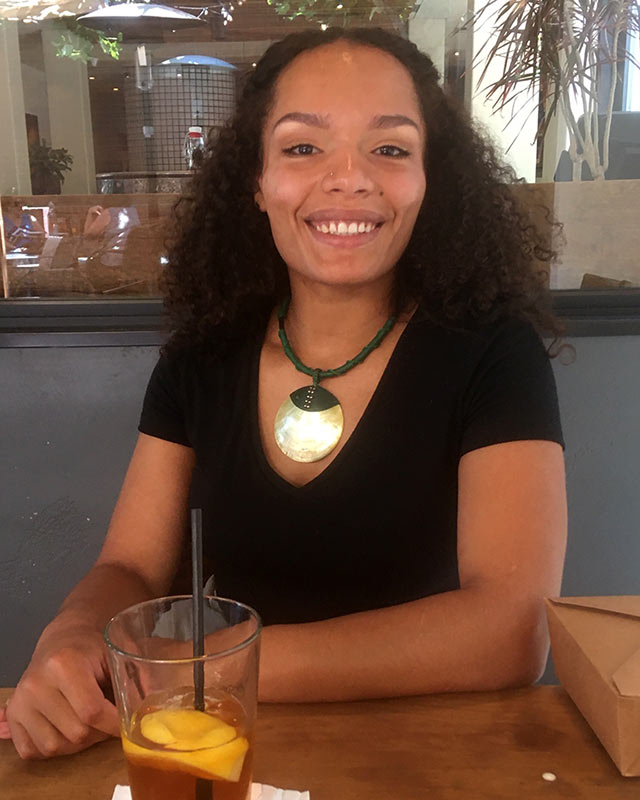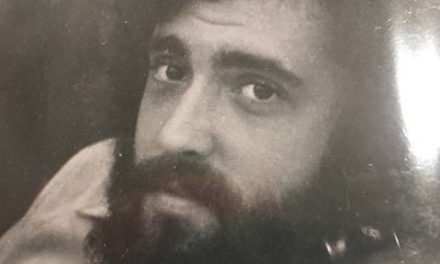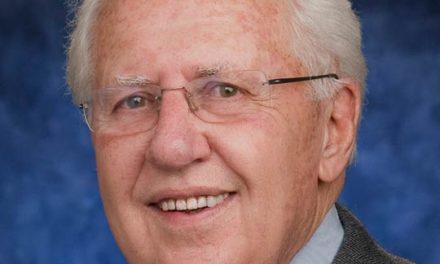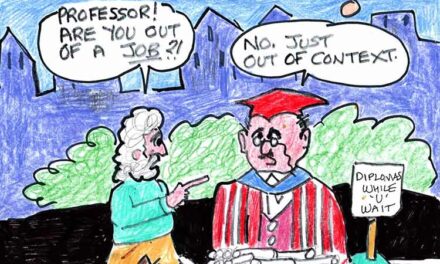Monique McDaniel Is Making Up for Lost Time
About to enter Claremont College’s master’s program, this former foster child has serious goals
By Ed Goldman
I don’t know what I am,” says Monique McDaniel. She’s referring to her ethnicity, not her ethics—and most certainly, not her work ethic. Because at 24 years old, as she preps to jump into the master’s program in Claremont College’s cultural studies department, this young woman, who spent most of her childhood “bouncing around from foster home to foster home,” has put herself on a six-year journey to earn her master’s degree, doctorate degree and then “become a professor so I can help other young people find themselves.”
There was a brief hiatus from the foster-care system when, at the age of five, her foster parent adopted her. That lasted to the age of 11, when McDaniel says she “was very happy to leave that place and re-enter the system.”
Monique McDaniel. Photo by Ed Goldman
That’s when the serious bouncing began. “I couldn’t stand to stay in a foster home for more than about six months,” she says over a recent Saturday lunch on the patio at Piatti Italian restaurant, in Sacramento’s Pavilions Shopping Center. “Eventually, they stopped letting me jump from one to another.” She offers an incandescent smile—which isn’t exactly the first thing you’d expect from someone whose life intersected with so many instant families and produced so many back stories.
McDaniel has been working since February as an administrative assistant for the Foster Youth Education Fund (FYEF)—and for more than a year before that, was a graduate assistant and peer mentor for the Ronald E. McNair Post-Baccalaureate Scholars Program in Sacramento (named in honor of the Black NASA astronaut and physicist who died during the Space Shuttle Challenger launch disaster in 1986).
The FYEF provides educational support for young-adult, soon-to-be-former foster kids who’ve completed their high school education and hope to obtain a degree at a two-year or four-year accredited college, university or tech/trade school. One of the fund’s goals is to improve a statistic that could be seen as discouraging: only three percent of California’s foster youth get a bachelor’s degree.
Through a variety of scholarships and grants—made possible by the fund’s partnerships with Sacramento State’s and UC Davis’s separate Guardian Scholars Programs, as well as the largesse of individual donors—the FYEF fund, which came into being 18 years ago, provides money for tuition, books, housing and campus transportation, and, most helpful in this era, gifts of laptop computers and phones. As of this month, the FYEF has worked with 800 foster youth and will award 60 scholarships this year.
McDaniel, who has a BA in ethnic studies from Sac State (as well as an associate of arts degree from Butte College) says she’s been grateful to have had a laptop at her disposal for her work, and anticipates having one to take with her to Claremont—along with, possibly, a new I-Phone. She’s won three scholarships to date for her undergraduate work. “I’ve aged out of a lot of grants and scholarships,” she says, “and I’m going to grad school. So we’ll have to see what will be available.”
She was placed in a foster home at the age of three, McDaniel says, “by a white woman [who adopted her two years later] who already had three children of her own. But they were pretty much grown, and I think she missed having babies.” But the woman, who wasn’t able to work due to a variety of problems, and relied mainly on the government funds provided to foster parents, “just couldn’t handle it as a I grew up,” McDaniel says. “It’s why my leaving to go back into the foster system was fairly mutual.”
At the age of 18, a social worker helped pave the way for McDaniel to meet her birth mother, who’d put her into foster care shortly after she was born. “I had no expectations or serious hopes about her by that time,” she recalls. “There had been times in my life I’d felt I really needed her and I didn’t really know where I wanted my meeting her to go. But she was very nice and had worked very hard for most of her life, mainly in janitorial work, so even though she was in her 70s, I guess, she seemed old for her age.” I ask McDaniel if she’s maintained contact with her mom during the past six years and her reaction perfectly illustrates the expression about someone “smiling enigmatically” while offering no details.
McDaniel has, she says, “a passion for research and writing.” She’s especially drawn to ethnic studies “and people finding out who they are and what that means.”
The look in her eyes tells me that despite her remark at the beginning of this column, Monique McDaniel knows exactly what and who she is.
Ed Goldman's column appears almost every Monday, Wednesday and Friday. A former daily columnist for the Sacramento Business Journal, as well as monthly columnist for Sacramento Magazine and Comstock’s Business Magazine, he’s the author of five books, two plays and one musical (so far).












